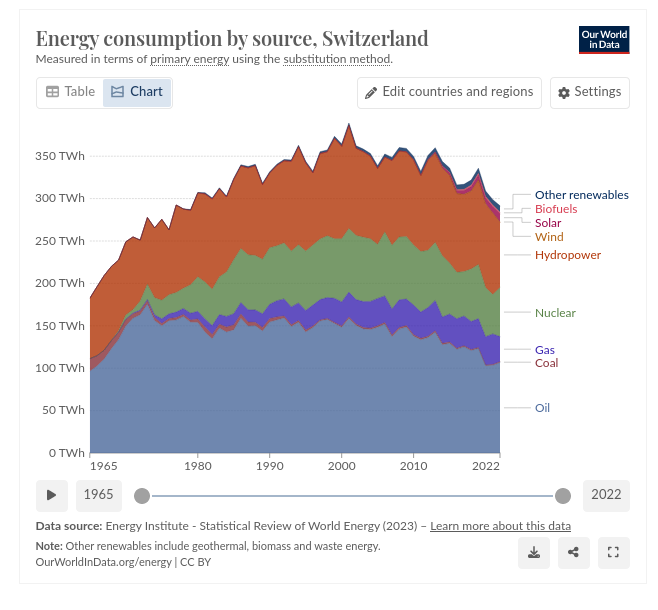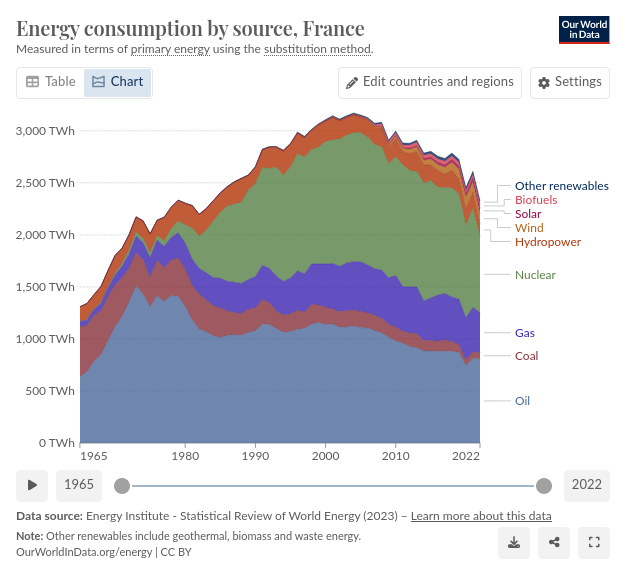

Not sure what the underlying software is/are, but I’m pretty sure this what they’re referring to: https://docs.forge.apps.education.fr/


Not sure what the underlying software is/are, but I’m pretty sure this what they’re referring to: https://docs.forge.apps.education.fr/
In case the “dim” comment isn’t a joke, as I recall it’s short for “dimension”, as in you are specifying each variable’s dimension in the computer’s memory. Source: some “intro to programming with vb6” book I read like 15 years ago at this point.


Microsoft is pivoting its company culture
Oh yes, the thing they’re well known for succeeding at.


According to Our World In Data (which claims to use the Energy Institute’s Statistical Review of World Energy from 2023 as a data source), that waste is from producing around 70 TWh each year:

That only covers around a third of Switzerland’s energy consumption over those years. Furthermore, Switzerland is a small mountainous country with decent access to hydropower (making up around a third of its needs over the same years). They are not necessarily representative of the waste that would accumulate from a more agressive switch from fossil fuels to nuclear across the world (which is what we’re talking about, if I’m not mistaken).
France is about 10 times larger in surface area and according to the same source, consumed/produced over 1,000 TWh of nuclear energy each year:

And officially has still has no place to put the high-energy waste (source - in french), leaving it up to the plant’s owners to deal with it. There is an official project to come up with a “deep” geological storage facility, but no political will seems musterable to make that plan materialize beyond endless promises.
I should mention that I’m not super anti-nuclear, and I would certainly rather we focus on eliminating coal and oil power plants (and ideally natural gas ones as well) before we start dismantling existing nuclear reactors that are still in functioning order.
That being said, there are other problems with nuclear moving forwards besides waste management. The main one that worries me is the use of water for the cooling circuits, pumped from rivers or the sea. Not only do open cooling circuits have adverse affects on their surrounding ecosystems, as the planet gets warmer and the temperature swings during the hotter seasons become more pronounced, the power plants will become less efficient. The water going in will be at a higher temperature than it is today, and thus will absorb less energy from the nuclear reaction itself.
Overall, I don’t trust our current collective responsibility as a species to manage our current forms of nuclear production. Russia sent its own troops into the Chernobyl Exclusion Zone to dig trenches in contaminated soil last year, and they allegedly recognized last week that the Zaporizhzhia power plant is now “unsafe to restart” because of the military activity in the region.
The world has not experienced generalized warfare with nuclear power plants dotting the countryside; WW2 ended around a decade before the first nuclear power plants were up and running in the USSR, the UK, and the USA.
Not to mention how few European countries have access to uranium on their own soil/territory. Of course, most of the rare earth metals used in photoelectric panels and windmills aren’t found there either, but as least with “renewables” they are used once to make the machinery, not as literal fuel that is indefinitely consumed to produce power.
I don’t know enough about thorium-based reactors nor molten salt-based reactors to go to bat for them instead, but they seem like a more promising way for nuclear to remain relevant.


I was saying that it’s weird to blame Mastodon for “complex sign-up”, when you’re using a “3rd-party” tool to do so. That’s completely down to the app.
Ah, I understand now. Thanks for the correction.


Why would anyone try to register via a non-official app first (especially for a procedure like signin-up) is beyond me.
You may or may not have heard this before, but the app is not the instance is not the platform. I registered both my Mastodon account and this Lemmy account via their respective instance websites. I used mastodon in the browser for literally over a year before installing an app for it on my phone.
Apps are alternative front-ends to the fediverse, even “official” ones.
“Basic stuff” is very weird to read for me when many of the internet services I have accounts for don’t have apps - and I would rather they never make an app for it. My electricity bills, my hosting costs, my home internet, all are done through web pages that I can access from any internet-connected device, unlike an app.
Not to mention I appreciate being able to type things on a bigger screen and physical keyboard when I register for things.
Lastly, it is much easier for me to deal with a sloppily made website than a sloppily made app. I can use extensions, and if need be can open up the network tab to see if the registration request was accepted or not before the website malfunctioned on my end.
I really appreciate Linus trying to tone down the nastiness in his replies over the years, but I’d be willing to let almost anything slide if it means getting a proper, old-school Torvalds tear-down of Musk.
Maybe nowadays, with Elon’s imbecility so publicly visible.
I’ve run Arch for close to 10 years, and was pretty jazzed by Musk in the early days of his presiding over Tesla and Space X. Then again, I was barely an adult at the time, and I hadn’t yet come across the first reports of terrible working conditions and his overall shittyness as a manager/exec.


Still, I think the only way that would result in change is if the hack specifically went after someone powerful like the mayor or one of the richest business owners in town.


As long as i can prompt-engineer my way into twice the salary for half the hours, that might still be worth it!
In case you’re unaware, the “deep inhale” is because that phrasing is historically tied to the WINE project, as per their website (winehq.org):
Wine (originally an acronym for “Wine Is Not an Emulator”)
And at this point it’s like a 10-year old meme (if not 20) to bring it up when someone may seem unaware of the distinction between emulation and what Wine does.
It is a bit tired of a reference, and I imagine somewhat off-putting of a response to receive when you don’t know the reference yourself. The acronym is in the spirit of the GNU one (“GNU’s Not Unix”), and as the other commenters have explained the fact that wine does something different than emulation is very relevant when you get into the nitty-gritty details, so it has extra sticking power in terms of memes in linux/foss communities.


I have no idea how widespread it is among other distros, but ArchLinux’s bootable install disk/iso comes with a genfstab command that snapshots your current mount points and outputs it as a fstab.
You still need to figure out where and how to mount everything yourself, but at least it saves you from most typos that could otherwise end up in the fstab file.
“Direct Action” oh, look, they have the same name as the far right terrorists in France. What a surprise.